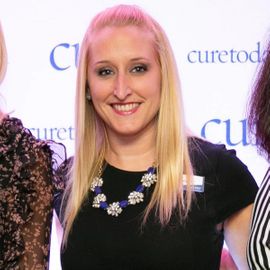- About Us
- Advertise / Support
- Editorial Board
- Contact Us
- CancerNetwork.com
- TargetedOnc.com
- OncLive.com
- OncNursingNews.com
- Terms & Conditions
- Privacy
- Do Not Sell My Information
- Washington My Health My Data
© 2025 MJH Life Sciences™ and CURE - Oncology & Cancer News for Patients & Caregivers. All rights reserved.
Ten-Year Bone Cancer Survivor Rides 'Coast 2 Coast'

Kristie L. Kahl is vice president of content at MJH Life Sciences, overseeing CURE®, CancerNetwork®, the journal ONCOLOGY, Targeted Oncology, and Urology Times®. She has been with the company since November 2017.
Dana Vaughns and his colleagues rode 3,000 miles across the U.S. in support of funding research for the V Foundation.
With the goal of giving patients with cancer the ability to make more memories, 10-year bone cancer survivor Dana Vaughns joined 109 of his colleagues from Bristol-Myers Squibb in riding 225 miles each as part of the V Foundation’s Coast 2 Coast 4 Cancer ride.
“I just knew that if there was a way to get through (my cancer) and help inspire some others along the way, then I was all for it,” Vaughns said. “Here I am 10 years later, just completing the bike ride, which is something that I never thought I'd be able to do — especially even just riding a bicycle in in the position that I would be in on a consistent basis, putting that stress on the area where I had my surgery to treat the bone cancer was a concern. But now I'm strong enough to be able to get through it and I'm very, very proud to have been able to complete it.”
CURE spoke with Vaughns about his experience riding in the Coast 2 Coast 4 Cancer ride and why events like this are important to continue funding research for cancer treatments with the V Foundation.
CURE: What was running through your mind leading up to the event?
Vaughns: Anxiety, a little nervousness thinking, “Can I actually complete this?” I mean, you could say that all the way up until the point of “Now you’ve got to go and make it happen.” And when I was out there with my other colleague, going up those hills and needing some support and some energy, I would look up, I would look at a name on someone's shirt, or even think about the names that are on my shirt that I was riding on behalf of, that really propelled me to get up every single hill that was in front of us.
Knowing what it is that I was riding for and who I was riding for, there was no way I was going to stop. I had to do it on behalf of them, I had to do it on behalf of myself. I knew that if I could complete this, then that would be a triumph over cancer for me. And for those that I was riding for, whether I was riding for them — in honor of or in support of what they're going through currently right now. So, it was really just more of an inspiration for me to get through this process. And I knew that if I can do it, and those that are still here that are currently fighting cancer, they can overcome anything and that was that was a major goal for me.
What did crossing the finish line mean to you?
Wow, it was it was exhilarating. I mean, to have completed 200 miles, to have climbed over 10,000 feet, to have sat on a bicycle saddle for 14 hours, to have realized that all of the training leading up to this point now had come to a conclusion was exhilarating. It was something that I'll never forget for sure.
Why do you think events like this are important?
It's important because we ensure that we're staying in front of this thing called cancer. And if we can continue to rally local support, national support, do the fundraising efforts from the ground from the grassroots level in to raise funds for innovation. It's the right thing to do. And we have to find a way to be able to come up with solutions for cancer, whether they be cured, whether they be better treatments, we just have to ensure that we stay out there because the next person that may be diagnosed is going to rely on that they're going to need that. Our kids and our kids’ kids need to be doing this today. It is very important that we're not just doing this for now. But we're doing it for tomorrow. And that's why I think it's critically important for us to continue to do the resources necessary that can help someone when diagnosed at some point their in their lives. Know that they have a solution for what they've got going on. I think that's really critical for us to continue to do what we're doing.
Related Content:



